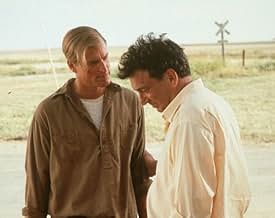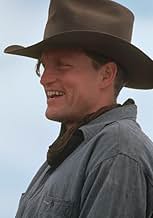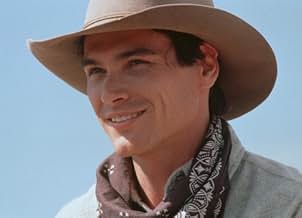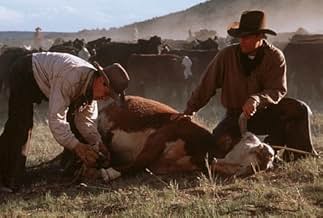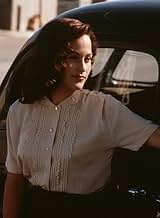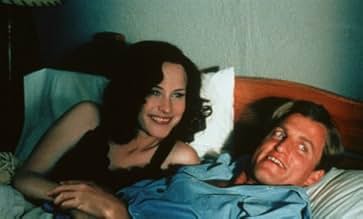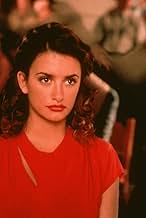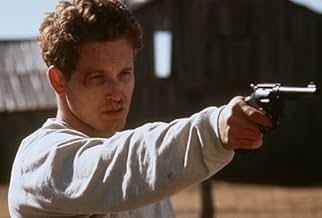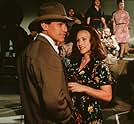PUNTUACIÓN EN IMDb
6,1/10
4,7 mil
TU PUNTUACIÓN
La amistad de dos vaqueros se pone a prueba cuando se enamoran de la misma chica.La amistad de dos vaqueros se pone a prueba cuando se enamoran de la misma chica.La amistad de dos vaqueros se pone a prueba cuando se enamoran de la misma chica.
- Dirección
- Guión
- Reparto principal
- Premios
- 4 premios y 4 nominaciones en total
Darren E. Burrows
- Billy Harte
- (as Darren Burrows)
Reseñas destacadas
The Hi-Lo Country has it all: male bonding, bar fights, passion and obsession. The characters reflect the brutality and the charm of old ways which refuse to die. Great performances by Woody Harrelson and the younger Billy Crudup who star as lifelong friends whose world made of land and cattle start changing under their feet after their return from World War II.
The Hi-Lo Country is an involving, intense and somewhat nostalgic western which tries to abandon traditional plot lines while using all the classic western cliches. Strongly advised to people who like some "melo" in their "drama".
The Hi-Lo Country is an involving, intense and somewhat nostalgic western which tries to abandon traditional plot lines while using all the classic western cliches. Strongly advised to people who like some "melo" in their "drama".
Great to see a new western and this one was particularly good to look at: capturing the flat, wide western country with all its beauty and natural dangers and contrasting it nicely with the badly-lit, cramped and emotionally charged interior spaces of its bars, farmsteads and honky-tonks. Outside there might be sun, drought, wind and snow, all largely visited at nature's whim; inside there's all sorts of very human dangers, including: infidelity, cheating, financial and legal corruption, and witchcraft - which can all be largely seen as a breaking down of loyalty and trust. War, the demands of the market-place and changing times in general, are shown to have bought a dislocation to the traditional rural certainties of conduct and order; the same forces splitting both the community at large and individual families.
Ed Buscombe's masterly review in Sight and Sound articulated my own slight sense of disappointment with the film. He rightly saw that the character of Big Boy, as played by Woody Harrelson, fails to convince that he is worthy of the strength of love and loyalty that Pete and others feel for him. As Buscombe says, his antics too often subside into a charmless boorishness - contrast this say with Kristofferson's Billy the Kid for Peckinpah, whose behaviour is equally wild but we never doubt his basic goodness and accept the affection in which he is generally held.
The film's recreation of the1940s was very nicely done: with terrific locations and just enough of the right artefacts to suggest the period, rather than an over-dressed museum tableau. The film cleverly slips between that contemporary world and an oppositional timelessness in the unchanging rhythm of the cowboy's life. I liked the way the film's characters acknowledge the anachronistic effort required to follow the cowboy life in 1940s post war USA: "I hear you're having an old fashioned cattle drive" Mona says to Pete, and earlier when Pete suggests to Jim Ed Love, the cattle baron, that "people still drive their cattle to the railhead" he replies "only in the movies".
More than a nod then to Red River, with its fascination with the changing demands of the market place and the effects those changes bring to ranch and cowboy. At heart HiLo is not much more than a rather tacky melodrama but its still very watchable: its lovingly shot, it just about keeps the western mythology alive and it has some great songs. It also has good supporting performances from Billy Crudup (Pete), Patricia Arquette (Mona) and Rosaleen Linehan (Mrs Big Boy), in particular.
Ed Buscombe's masterly review in Sight and Sound articulated my own slight sense of disappointment with the film. He rightly saw that the character of Big Boy, as played by Woody Harrelson, fails to convince that he is worthy of the strength of love and loyalty that Pete and others feel for him. As Buscombe says, his antics too often subside into a charmless boorishness - contrast this say with Kristofferson's Billy the Kid for Peckinpah, whose behaviour is equally wild but we never doubt his basic goodness and accept the affection in which he is generally held.
The film's recreation of the1940s was very nicely done: with terrific locations and just enough of the right artefacts to suggest the period, rather than an over-dressed museum tableau. The film cleverly slips between that contemporary world and an oppositional timelessness in the unchanging rhythm of the cowboy's life. I liked the way the film's characters acknowledge the anachronistic effort required to follow the cowboy life in 1940s post war USA: "I hear you're having an old fashioned cattle drive" Mona says to Pete, and earlier when Pete suggests to Jim Ed Love, the cattle baron, that "people still drive their cattle to the railhead" he replies "only in the movies".
More than a nod then to Red River, with its fascination with the changing demands of the market place and the effects those changes bring to ranch and cowboy. At heart HiLo is not much more than a rather tacky melodrama but its still very watchable: its lovingly shot, it just about keeps the western mythology alive and it has some great songs. It also has good supporting performances from Billy Crudup (Pete), Patricia Arquette (Mona) and Rosaleen Linehan (Mrs Big Boy), in particular.
I really enjoyed this ''modern'' western about two young war veterans coming back home from the war zone and trying to make a living by working as old-fashioned cowboys. Pete Calder ( Billy Crudup ) is the shy and reserved one, Big Boy ( Woody Harrelson ) the risk taker with the biggest mouth and smoothest bluffing skills. Their friendship is threatened by the lovely Mona ( Patriccia Arquette ); an adulteress, sending in mixed signals to both of the boys.
You know, I sometimes don't get it why good movies get low or mediocre scores. The way I see it, this movie has its flaws, but it is almost as good as the recent Brokeback Mountain. I really like this epic story about unreachable love and jealousy at someone you consider as a true friend. Add the intense bar fights, gorgeous scenery and a top cast, I'd say this is a very good movie. The only thing I have to comment is that some of the characters just don't get so much attention as they deserve ( like the Mexican guy or Hoover Young ). It felt as if their characters had an important role in the novel, but there just wasn't the time for them in this movie to give them their deserved deep layer. Alas, I can live with that.
You know, I sometimes don't get it why good movies get low or mediocre scores. The way I see it, this movie has its flaws, but it is almost as good as the recent Brokeback Mountain. I really like this epic story about unreachable love and jealousy at someone you consider as a true friend. Add the intense bar fights, gorgeous scenery and a top cast, I'd say this is a very good movie. The only thing I have to comment is that some of the characters just don't get so much attention as they deserve ( like the Mexican guy or Hoover Young ). It felt as if their characters had an important role in the novel, but there just wasn't the time for them in this movie to give them their deserved deep layer. Alas, I can live with that.
The point of this exercise escapes me. Today, in 1999, there are probably two valid reasons for reviving a relic of a genre - to provide an old-fashioned, nostalgic, action-packed adventure, or to remould the Western in our age's image, to try to see what the form can say about us, our ideologies, and, most importantly, our relation to history. This film does neither.
On the one hand, it has many of the virtues of the traditional Western - lovingly bleached landscapes; a pompous, overwrought score; cattle runs; male bonding. But it has neither a compelling narrative drive, charismatic characters, nor a mythic sensibility.
On the deconstructive side, it seems to want to critique the problematic values of the West. The maverick rebel versus corporate muscle is, as has been pointed out, a theme worthy of Peckinpah, but its treatment lacks his romantic passion, violent sympathy, or dynamic self-pity.
The hero, Big Boy, is, according to some, a subject of the film's censure, but the only fault I can find in him is that he is probably impotent, and if that's supposed to be an iconoclastic weakness, than the filmmakers are being rather macho. So he's a bit wild and brutal; he's also loyal, dignified and amusing, and Woody Harrelson invests him with much charm. The rest of the characters, especially Pete, with his wretched narration(there are never voiceovers in Westerns!), are dull and unreal.
Jim Kitses has called the film a melodrama, and to an extent this is true - this is no quest narrative; there is no building a white US culture, no battle between the primitive and civilisation as one finds in the Fordian western. Much of the action focuses on the domestic. A recurring motif is barbed wire, suggesting that the characters are as corralled as the animals they steer, in a prison whose walls actively hurt.
The film is also faintly unusual in having a woman in a pivotal role, although Patricia Arquette is, as usual, quite appaling. However, without me revealing it, the coda betrays all this, reverts twofold to the old 'Print the legend' pack of lies, and still holds out faith in the 'Go west, young man' myth, exactly as they did in the old days.
Stephen Frears has been praised for adapting to the mores of the Western, but this is surely untrue. Photographing desert landscapes, however beautifully, does not make you a great Western filmmaker. You must have a critical apparatus, whether its through the use of montage, like Peckinpah, or though music and composition, like Leone. As a revisionist, Frears has actually regressed from these masters. There is very little of his stamp at all, none of the genre knowledge he showed in The Grifters, one of the great films of the 90s.
He is best at revealing claustrophobic and deceitful sexual tensions and power games between small groups of (often related) people. There are some excellent examples of this here, especially when the four lovers gather after the barroom brawl; there are also a few good scenes, and gorgeous silhouettes: but mostly the thing flounders in its own insecurity and reverence.
On the one hand, it has many of the virtues of the traditional Western - lovingly bleached landscapes; a pompous, overwrought score; cattle runs; male bonding. But it has neither a compelling narrative drive, charismatic characters, nor a mythic sensibility.
On the deconstructive side, it seems to want to critique the problematic values of the West. The maverick rebel versus corporate muscle is, as has been pointed out, a theme worthy of Peckinpah, but its treatment lacks his romantic passion, violent sympathy, or dynamic self-pity.
The hero, Big Boy, is, according to some, a subject of the film's censure, but the only fault I can find in him is that he is probably impotent, and if that's supposed to be an iconoclastic weakness, than the filmmakers are being rather macho. So he's a bit wild and brutal; he's also loyal, dignified and amusing, and Woody Harrelson invests him with much charm. The rest of the characters, especially Pete, with his wretched narration(there are never voiceovers in Westerns!), are dull and unreal.
Jim Kitses has called the film a melodrama, and to an extent this is true - this is no quest narrative; there is no building a white US culture, no battle between the primitive and civilisation as one finds in the Fordian western. Much of the action focuses on the domestic. A recurring motif is barbed wire, suggesting that the characters are as corralled as the animals they steer, in a prison whose walls actively hurt.
The film is also faintly unusual in having a woman in a pivotal role, although Patricia Arquette is, as usual, quite appaling. However, without me revealing it, the coda betrays all this, reverts twofold to the old 'Print the legend' pack of lies, and still holds out faith in the 'Go west, young man' myth, exactly as they did in the old days.
Stephen Frears has been praised for adapting to the mores of the Western, but this is surely untrue. Photographing desert landscapes, however beautifully, does not make you a great Western filmmaker. You must have a critical apparatus, whether its through the use of montage, like Peckinpah, or though music and composition, like Leone. As a revisionist, Frears has actually regressed from these masters. There is very little of his stamp at all, none of the genre knowledge he showed in The Grifters, one of the great films of the 90s.
He is best at revealing claustrophobic and deceitful sexual tensions and power games between small groups of (often related) people. There are some excellent examples of this here, especially when the four lovers gather after the barroom brawl; there are also a few good scenes, and gorgeous silhouettes: but mostly the thing flounders in its own insecurity and reverence.
People walked out of this film, presumably in disgust, perhaps because they were too hip for woody harrelson. I'm glad this film pissed people off - it proves it was stupidly honest, stupidly nostalgic, stupidly big-hearted and not cynical, clever, PC nor anti-PC, not a mockery of anything. It's an American film by a British director, and like Lolita, boils thick Americanisms down to crystals of statement, taste, elan. How could anyone walk out on the fat man yodelling as the camera dollied in to that tight close-up?! It was a gem of a shot, a little gauche perhaps, not unlike the marlboro country the film rolls through, and the naked desire for the days when men were MEN - with winning hands, whiskey shooters and a tasty redhead named Mona... But this isn't leering masculinity bristling with three day growth! There is a notable absense of guns (for a western), and when they appear they are not sharp and shiny but heavy, tarnished and chunky. This is MC Solaar's nouveau western - cutting up slow shy grins, dusty scuffles, mewling coyotes and a lugubrious soundtrack heavy with sentimental strings, trumpets and the convenient pause for punctuation. This is true Hollywood, and I mean that as a compliment. It was one of those rare occasions where suddenly you see the film as more style than substance. That's why it was showing in Darlinghurst and not the multiplexes! Because of Woody Harrelson - so stupidly generous, stupidly the big man with his big scruples and big square jaw - it is a film that could so easily slip by, scoffed at, discounted for wearing its heart upon its sleeve, pinned not far below the stars and stripes and the silver star for service to country, mateship as tight as knuckles, horses with bottom and all that glory.
It's a movie for Kerouac, he loved this kind of carousing and childishness. Here, life is Hi and the cattle lo, plain Lo, yet another adopted child of Scorsese and his deep deep pockets. "From the depths of my reputation I bring you..." How dare he! Kidnapping the history of American film, like he was god's gift to world cinema, doing it all as a public service. But its worth it for Billy Crudup with his old man's shoulders, Billy with his switchblade, Steve with his necktie, straight six and coronary, LB and Bigboy - it all comes down to Bigboy - the backbone of the film, the gut-feeling and laboured gasp of this weighty piece of cinema.
It's old-school treatment, all sinew and gristle, bloody hooves; pretty dresses, buddy bottles and mexican girls who visit fortune-telling witches. It's a film which doesn't teach America's children to express their anger with words not weapons. No, like Apache tank-killers and cruise missles flattening Serbian houses, it tells Americans to go hard or go home - take it square on the chin, tear those clothes off and take whatever gratification you can get whilst still being the best man, the best friend, a good man with a natural feel for horses. It's homestyle American apple pie, all fragrance and warm pressure, like a horse nibbling oats out of the palm of your hand. So rope em and rape em cause nothing's keeping a good man down cept for a bullet in the chest or a pair of wide open thighs... And while I bluster, it's all poetry in the Hi-lo country, with its bloated cattle and californian dreams, snow on the ranges and the good ol' boys, we're just telling it like it is...
Further notes. The preview contains many scenes that are not in the film : wartime footage, bigboy coming back for pete in the blizzard. In fact the preview contains all the elements superfluous to the film. It is not the story of a woman coming between two friends, it's a story about a way of life coming to an end, a coming of age, and the quality of relationships.
And returning to the generic music score I criticised earlier, from the preview I have identified (some of) it as sounding very similar to the opening to Fargo! What is this piece of music?
It's a movie for Kerouac, he loved this kind of carousing and childishness. Here, life is Hi and the cattle lo, plain Lo, yet another adopted child of Scorsese and his deep deep pockets. "From the depths of my reputation I bring you..." How dare he! Kidnapping the history of American film, like he was god's gift to world cinema, doing it all as a public service. But its worth it for Billy Crudup with his old man's shoulders, Billy with his switchblade, Steve with his necktie, straight six and coronary, LB and Bigboy - it all comes down to Bigboy - the backbone of the film, the gut-feeling and laboured gasp of this weighty piece of cinema.
It's old-school treatment, all sinew and gristle, bloody hooves; pretty dresses, buddy bottles and mexican girls who visit fortune-telling witches. It's a film which doesn't teach America's children to express their anger with words not weapons. No, like Apache tank-killers and cruise missles flattening Serbian houses, it tells Americans to go hard or go home - take it square on the chin, tear those clothes off and take whatever gratification you can get whilst still being the best man, the best friend, a good man with a natural feel for horses. It's homestyle American apple pie, all fragrance and warm pressure, like a horse nibbling oats out of the palm of your hand. So rope em and rape em cause nothing's keeping a good man down cept for a bullet in the chest or a pair of wide open thighs... And while I bluster, it's all poetry in the Hi-lo country, with its bloated cattle and californian dreams, snow on the ranges and the good ol' boys, we're just telling it like it is...
Further notes. The preview contains many scenes that are not in the film : wartime footage, bigboy coming back for pete in the blizzard. In fact the preview contains all the elements superfluous to the film. It is not the story of a woman coming between two friends, it's a story about a way of life coming to an end, a coming of age, and the quality of relationships.
And returning to the generic music score I criticised earlier, from the preview I have identified (some of) it as sounding very similar to the opening to Fargo! What is this piece of music?
¿Sabías que...?
- CuriosidadesDirector Sam Peckinpah tried to get this movie produced for years, but unfortunately he died before he had the chance.
- PifiasA Coke vending machine is clearly labeled ten cents. In this part of the country in the late 1940s it would have been five cents. Around 1960 vending machines went to six cents, quite a novelty at the time, requiring two coins to get a Coke. It was later in the 1960s when vending machines finally went to ten cents.
- Citas
Pete Calder: I once set out to kill a man. I took pleasure in the thought of his death.
- Banda sonoraQue Chulos Ojos
Written by Francisco Cantu
Performed by Hermanas Ayala
Published by San Antonio Music Publishers, Inc.
Selecciones populares
Inicia sesión para calificar y añadir a tu lista para recibir recomendaciones personalizadas
- How long is The Hi-Lo Country?Con tecnología de Alexa
Detalles
- Fecha de lanzamiento
- Países de origen
- Sitio oficial
- Idioma
- Títulos en diferentes países
- Terra de cowboys
- Localizaciones del rodaje
- Empresas productoras
- Ver más compañías en los créditos en IMDbPro
Taquilla
- Recaudación en Estados Unidos y Canadá
- 166.082 US$
- Fin de semana de estreno en EE. UU. y Canadá
- 17.712 US$
- 3 ene 1999
- Recaudación en todo el mundo
- 166.082 US$
- Duración1 hora 54 minutos
- Mezcla de sonido
- Relación de aspecto
- 2.35 : 1
Contribuir a esta página
Sugerir un cambio o añadir el contenido que falta

Principal laguna de datos
By what name was Hi-Lo Country (1998) officially released in India in English?
Responde


